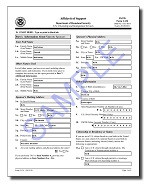
Before the U.S. government grants a non-immigrant visa for a foreign national to visit the United States, the visa applicant must prove to the consular officer that they are not likely to become a public charge. In other words, the visa applicant must demonstrate that they have enough money to pay for their expenses during the course of the trip.
Declaration of Financial Support (Form I-134) Overview
Visitors who have difficulty proving they have sufficient resources during the course of a trip may use Form I-134, Declaration of Financial Support, as a way to overcome the problem. Often the I-134 declaration may be necessary for visitors who are young people, low-income travelers and others. Many embassies may also require the declaration for K-1 fiancé visa applicants. A supporter (sponsor) generally prepares Form I-134 on behalf of the beneficiary visitor.
CitizenPath provides an affordable service to help you quickly and accurately prepare Form I-134, Declaration of Financial Support, for your situation. We also provide numerous articles to help you interpret the instructions for I-134.
Eligibility to be a Form I-134 Supporter
Generally, I-134 supporters should be U.S. citizens or lawful permanent residents who are at least 18 years of age and have an income that is greater than 100 percent of the federal poverty guidelines. However, other individuals may act as supporters according the USCIS instructions for I-134. U.S. nationals and even certain non-immigrants may also act as supporters provided they have a Social Security number and the requisite household income.
Sectional Instructions for I-134
Part 1: Basis for Filing
Indicate who will be filing Form I-134; the filer will be the beneficiary or another individual. Generally, the person acting as the supporter is an individual other than the beneficiary. It's unusual for the beneficiary to filing Form I-134 on behalf of themselves, but it is possible in limited situations.
Part 2: Information About the Beneficiary
Provide information about the beneficiary. The beneficiary is the non-immigrant entering the United States and will benefit from the declaration. For Beneficiary's Anticipated Length of Stay, provide estimated dates regarding the beneficiary's stay in the United States. It's unusual to have "No End Date" unless the beneficiary is present through humanitarian parole. For Beneficiary's Financial Information, list all the beneficiary's dependents and their contribution to the household income (if applicable). You'll also need to list assets in the beneficiary's household if you want them considered. You can list almost any type of asset. However, only enter the net value and be prepared to document the value when you submit the declaration.
Part 3: Information About the Individual Agreeing to Financially Support the Beneficiary Named in Part 2 (Supporter)
If you've selected "Another individual who is the beneficiary" in Part 1, you are the supporter. Part 3 is for information about you.
Provide details about your name(s), addresses, birth, and other information. Always use a Mailing Address where you can reliably receive mail from USCIS. If you receive mail at someone else’s home, enter that person’s name in the “In Care Of” line.
For Employment Information, provide details about your employer. Regardless if you are unemployed or retired, you'll need to document your income to meet the federal poverty guidelines for your household size. In the section about Financial Information, list all dependents and their contribution to the household income (if applicable). List assets in the supporter's household if you want them considered. Supporters must also disclose if they have any Financial Responsibility for Other Beneficiaries that could impact available resources. This includes other persons already supported via a Form I-134. Finally, indicate if you have Intent to Provide Specific Contributions to the Beneficiary. This is the appropriate place to list any room, board, or cash support you plan to give the beneficiary during their visit.
I-134 Supporting Documents
The USCIS instructions for I-134 are very weak when describing the requisite evidence to submit with the form. You must show you have sufficient income or financial resources to assure that the foreign national you are supporting will not become a public charge while in the United States. Generally, you will need to submit:
- Evidence of supporter's U.S. citizenship or immigration status
- Federal income tax return or IRS tax transcript from the most recent tax year
- Evidence of current income such as paystubs and an employment verification letter
- Evidence of asset ownership and value (if applicable)
Again, you must prove that your income meets or exceeds the federal poverty guidelines for your household size. CitizenPath’s service to prepare the declaration will calculate these numbers for you so that you know your qualifications before submitting Form I-134. Our software will also generate a personalized list of supporting documents based on your specific situation. Learn more >>
Sample of Form I-134
In this I-134 Declaration of Financial Support sample, the supporter has a household of 4. It includes the supporter, his spouse, his child, and the beneficiary. The household income is $52,500. Based on the federal poverty guidelines, this income is significantly more than 100 percent of the poverty guidelines for a household of four in the state of Florida. With supporting evidence that corroborates his stated income, this person is well-qualified to be the beneficiary’s supporter.

About CitizenPath
CitizenPath provides simple, affordable, step-by-step guidance through USCIS immigration applications. Individuals, attorneys and non-profits use the service on desktop or mobile device to prepare immigration forms accurately, avoiding costly delays. CitizenPath allows users to try the service for free and provides a 100% money-back guarantee that USCIS will approve the application or petition. We provide support for the Declaration of Financial Support (Form I-134), K-1 Visa Petition (Form I-129F), Adjustment of Status Application (I-485), and several other immigration packages.
Want more immigration tips and how-to information for your family?
Sign up for CitizenPath’s FREE immigration newsletter and
SAVE 10%
on our immigration services



